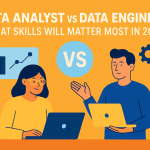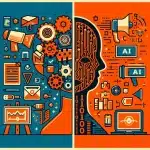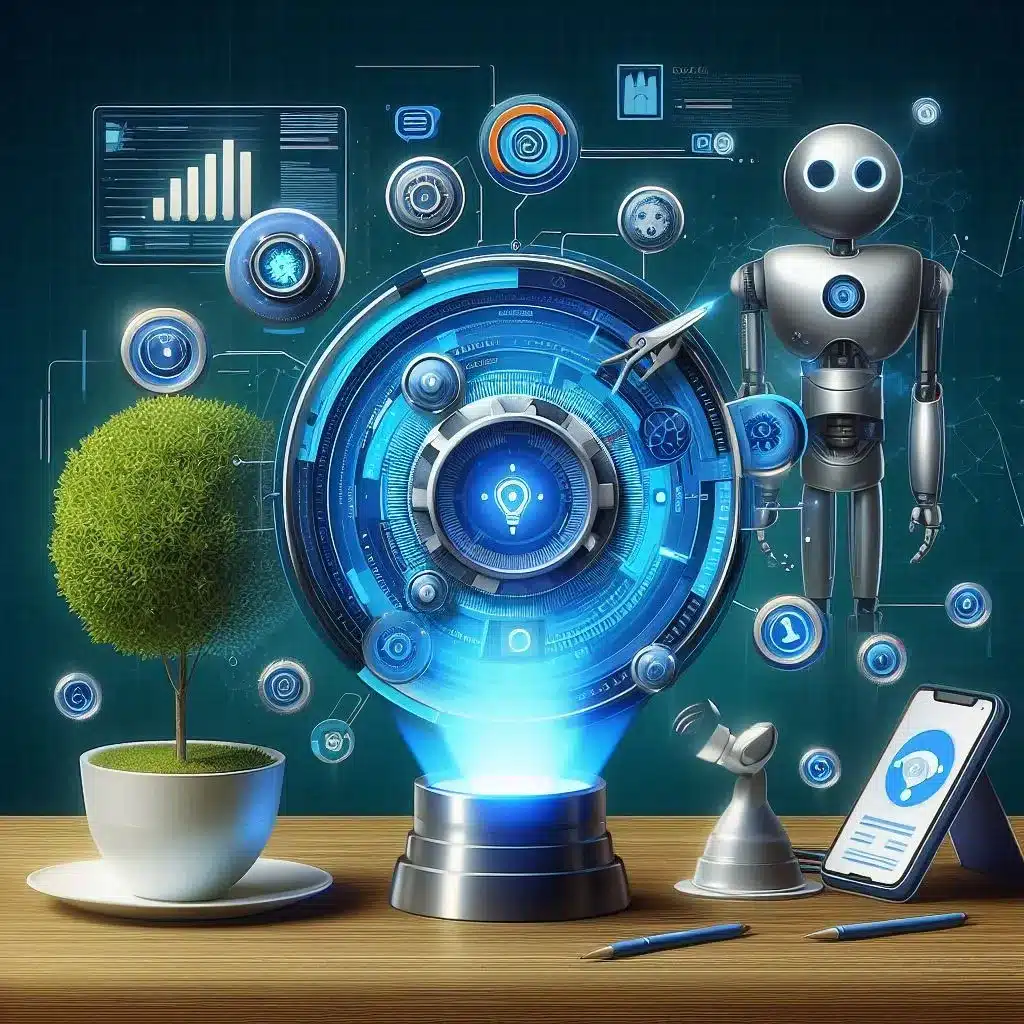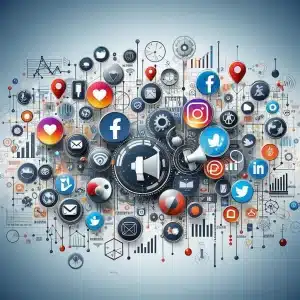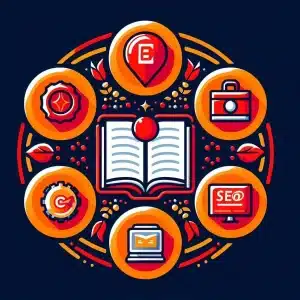
Will AI replace marketing jobs?
The debate around artificial intelligence (AI) is just starting. The meteoric rise of tools such as ChatGPT has sparked concern across industries, with marketing being no exception. As AI technologies continue to evolve, they are increasingly integrated into various aspects of marketing, from data analysis to customer engagement. This has led to growing concern among professionals: eventually, will AI replace marketing jobs?
In this article, we will explore the impact of AI on the marketing profession. We will examine how AI is being used in the industry, its potential benefits, and the implications for marketing roles. By understanding the capabilities and limitations of AI, we can better assess whether it poses a threat to jobs or presents new opportunities for marketing professionals.
This blog will discuss:
- How AI is currently used in marketing
- The benefits of AI for marketing tasks
- The challenges and limitations of AI in creative and strategic roles
- The evolving role of marketers in an AI-driven environment
The benefits of AI for marketing tasks
As artificial intelligence becomes more embedded in marketing strategies, it offers a range of benefits that significantly enhance how marketers operate. These advantages make AI an increasingly valuable tool for professionals looking to stay competitive in a rapidly evolving industry. Here’s how AI is transforming marketing tasks for the better:
- Improved grammar and structure of written content: AI-powered tools are increasingly used to enhance the quality of written content in marketing. These tools can analyse and correct grammar, punctuation, and sentence structure, ensuring that all written materials—from emails and blogs to social media posts—are polished and professional. Beyond correcting errors, AI can also suggest improvements to the overall flow and readability of the content, helping marketers create clearer, more compelling messages.
- Increased efficiency and time savings: One of the most significant benefits of AI is its ability to automate routine and repetitive tasks. By taking over time-consuming activities like data entry, email scheduling, and social media posting, AI allows marketers to focus on more strategic, creative aspects of their work. This not only boosts productivity but also frees up time for innovation and higher-level thinking.
- Better accuracy and data-driven decisions: AI excels at analysing large datasets with speed and precision, far beyond human capabilities. This allows human marketers to base their decisions on accurate, real-time data rather than intuition or outdated information. Whether it’s identifying trends, segmenting audiences, or predicting customer behaviour, AI provides marketers with reliable insights that drive more effective campaigns and strategies.
- Improved personalisation and customer service: In today’s marketing environment, personalisation is key to building strong customer relationships. AI enables a higher level of personalisation by analysing individual customer data to create tailored marketing messages and offers. This leads to more relevant interactions, increasing customer satisfaction and loyalty. Whether through personalised email content, targeted ads, or customised product recommendations, AI helps brands connect with their audience in more meaningful ways.
- Scalability of marketing efforts: Managing large-scale marketing campaigns can be challenging, especially when resources are limited. AI allows digital marketers to scale their efforts without a proportional increase in workload. For instance, AI can manage and optimise numerous ads across different platforms simultaneously, ensuring consistency and effectiveness. This scalability is particularly beneficial for businesses looking to grow their marketing reach without significantly expanding their teams.
- Cost-effectiveness: By streamlining processes and reducing the need for extensive manual labour, AI can also be a cost-effective solution for marketing teams. Automation reduces the hours spent on routine tasks, which can lower operational costs. Additionally, AI-driven insights help optimise marketing budgets by directing resources towards the most effective strategies, ensuring a higher return on investment.
The challenges and limitations of AI in marketing
While artificial intelligence offers numerous benefits for marketing, it’s important to acknowledge that it also comes with its own set of challenges and limitations. Understanding these drawbacks is essential for skilled marketers who wish to integrate AI effectively and responsibly into their strategies. Here are some of the key challenges associated with using AI in marketing:
- Dependence on data quality: AI’s effectiveness is largely dependent on the quality and quantity of data it processes. If the data fed into AI systems is incomplete, outdated, or biased, the insights and decisions generated by AI may be flawed. AI can even hallucinate! Marketers must ensure they have access to high-quality, relevant data, and implement robust data management practices to maintain accuracy. However, obtaining and managing such data can be challenging, particularly for smaller organisations with limited resources.
- Lack of creativity and human touch: While AI is excellent at analysing data and automating tasks, it falls short when it comes to creativity and emotional intelligence. Marketing often requires a nuanced understanding of human emotions, cultural context, and the ability to craft messages that resonate on a deeper level. AI tools may struggle to replicate the creativity and intuition that human marketers bring to the table, particularly in areas like brand storytelling, design, and complex strategic decisions.
- Ethical concerns and bias: AI systems are only as good as the data they are trained on, which means they can inadvertently perpetuate existing biases present in that data. This can lead to ethical concerns, such as targeting specific demographics unfairly or reinforcing stereotypes. Marketers must be vigilant in assessing the ethical implications of their AI-driven campaigns, ensuring that AI decisions align with ethical standards and are free from harmful biases.
- Cost and accessibility: While AI technology is becoming more widespread, the cost of implementing advanced AI tools can still be prohibitive for smaller businesses. In addition to the financial investment, there is also the need for technical expertise to manage and maintain AI systems. For businesses with limited budgets or access to skilled personnel, the adoption of AI can be challenging, potentially widening the gap between large corporations and smaller companies in terms of marketing capabilities.
- Integration challenges: Integrating AI tools with existing marketing technologies and systems can be complex. Ensuring that AI works seamlessly with other software, such as customer relationship management (CRM) platforms or content management systems (CMS), requires careful planning and execution. Marketers may face difficulties in achieving full integration, which can limit the effectiveness of AI and create operational bottlenecks.
- Over-reliance on automation: While automation can greatly enhance efficiency, there is a risk of becoming too dependent on AI-driven processes. Over-reliance on automation can lead to a lack of human oversight, which is crucial for maintaining creativity, ethical standards, and adaptability. Marketers must strike a balance between leveraging AI for efficiency and retaining the human elements that are essential for building authentic connections with customers.
What marketing jobs could AI actually replace?
- Basic design and video editing: AI-powered tools are becoming increasingly capable of handling basic design and video editing tasks. Simple graphic design, such as creating banners, social media images, or basic video edits, can now be automated using AI. While these tools may not yet rival professional designers and editors in terms of creativity and quality, roles that focus on routine, template-driven design and editing tasks could be at risk of being replaced by AI solutions.
- Basic content generation: AI has made strides in generating basic written content, such as product descriptions, simple reports, and even news articles. For example, AI tools can quickly create content based on predefined templates or data inputs. While creative writing and high-level content marketing strategy require human insight, roles that involve producing large volumes of standardised content could be at risk of automation.
- Email marketing: AI-powered platforms are increasingly able to automate the entire email marketing process, from segmenting audiences to personalising content and scheduling sends. Marketers who primarily focus on creating and sending email campaigns may find that AI can handle much of this work, especially in terms of optimising timing and content for better engagement.
- Social media management: While strategic social media planning and creative campaign development require human insight, some aspects of social media management could be automated. AI can schedule posts, analyse engagement metrics, and even generate basic social media content. Roles that focus solely on the operational side of social media, such as scheduling and reporting, may be at risk of being replaced by AI tools.
- Advertising optimisation: AI is increasingly used to optimise digital advertising campaigns by automatically adjusting bids, targeting, and creative elements in real-time. This can reduce the need for manual intervention in campaign management. Roles that focus on the day-to-day management of digital ads, particularly in programmatic advertising, may see a shift towards automation.
- Reporting and analytics: Generating reports and analysing marketing Data entry and management: One of the first areas where AI has made significant inroads is in data entry and management. Tasks that involve inputting, organising, and maintaining large amounts of data are highly repetitive and can be performed more efficiently by AI systems. Roles that primarily focus on these tasks may see a reduction in demand as AI becomes more prevalent.
- Customer segmentation and targeting: AI excels at processing large datasets and identifying patterns, making it highly effective for customer segmentation and targeting. Roles that involve manually segmenting audiences based on demographic or behavioural data could be automated as AI systems become more sophisticated in identifying and targeting specific customer groups with precision.
- performance data are tasks that AI can handle with increasing accuracy and speed. AI tools can automatically compile data, generate insights, and even suggest optimisations based on performance metrics. Marketers who primarily focus on creating reports or conducting routine data analysis may find these tasks increasingly automated.
How can marketing roles evolve to stay ahead of AI?
As artificial intelligence continues to integrate into marketing, it’s essential for professionals to adapt and evolve their roles to remain valuable. While AI can handle many routine tasks, there are areas where human marketers can excel and even enhance their contributions by leveraging AI as a tool rather than viewing it as a competitor. Here’s how marketing roles can evolve to stay ahead of AI:
- Emphasise creative strategy and innovation: AI may be able to generate content and optimise campaigns, but it lacks the ability to think creatively and develop innovative strategies. Marketers should focus on honing their creative skills and becoming experts in crafting unique brand narratives, developing original ideas for campaigns, and thinking outside the box. By leading the creative direction and innovation efforts, marketers can bring value that AI cannot replicate.
- Develop expertise in AI and technology management: As AI tools become more prevalent, there is a growing need for professionals who understand how to implement, manage, and optimise these technologies. Marketers who develop expertise in AI, data analytics, and marketing automation technologies will be well-positioned to take on roles that involve overseeing AI-driven processes. This includes selecting the right tools, interpreting AI-generated insights, and ensuring that AI is used ethically and effectively within campaigns.
- Focus on building and maintaining human relationships: Relationship-building remains a critical aspect of marketing that AI cannot replace. Marketers should prioritise developing strong interpersonal skills, including communication, negotiation, and empathy. These skills are essential for fostering long-term relationships with clients, customers, and partners. By focusing on the human element of marketing, professionals can provide the personal touch that AI lacks, ensuring that customer relationships remain strong and genuine.
- Specialise in strategic decision-making: While AI can analyse data and suggest optimisations, the strategic direction of a brand or campaign often requires human intuition and experience. Marketers who specialise in strategic decision-making can provide insights that go beyond data, considering factors such as brand identity, market trends, and competitive positioning. By taking on a more strategic role, marketers can guide the overall vision and long-term goals of their campaigns, ensuring that AI-driven efforts align with the brand’s objectives.
- Enhance storytelling and content curation: AI can assist in generating content, but it struggles to create engaging stories that resonate on an emotional level. Marketers should focus on mastering the art of storytelling, using their unique perspectives to craft compelling narratives that connect with audiences. Additionally, by curating content that reflects the brand’s voice and values, marketers can ensure that the brand’s message remains consistent and authentic across all platforms.
- Adapt to a collaborative work environment: The future of marketing will likely involve close collaboration between human marketers and AI tools. Marketers should embrace this collaboration, understanding how to work alongside AI to enhance their productivity and creativity. This might involve using AI to handle data-heavy tasks while focusing on areas where human judgment is crucial, such as creative direction and customer interactions.
- Continuous learning and upskilling: The marketing industry is rapidly evolving, and staying ahead of AI requires a commitment to continuous learning. Marketers should regularly update their skills, staying informed about the latest AI advancements, digital marketing trends, and emerging technologies. By pursuing professional development and staying curious, marketers can adapt to new challenges and seize opportunities in an AI-driven world.
How marketing roles can evolve to stay ahead of AI- Examples
Marketing Manager: How it can evolve: Marketing managers must understand how to integrate AI into their strategies, not as a replacement for human creativity, but as a tool to enhance their ability to craft innovative and effective campaigns.
- New focus areas:
Strategic vision and strong data-driven decision-making skills: Focus on the big picture and use time savings to be creative, and lead with data. - Interpersonal and communication skills: Managing relationships and fostering a collaborative team environment are areas where AI algorithms falls short.
Hiring skills: When hiring, marketing managers should seek team members who are digitally fluent, adaptable, possess strong analytical skills, and demonstrate creative problem-solving abilities.
Content Marketer
How it can evolve: Content marketers can shift from producing large volumes of routine content (which AI can handle) to focusing on high-impact, creative content. This includes developing in-depth thought leadership pieces, creating complex multimedia content, and driving content strategy.
New focus areas:
- Storytelling: Craft compelling narratives that align with brand values and resonate emotionally with the target audience.
- Content strategy: Develop strategic thinking and oversee a content strategy that aligns with long-term brand goals and adapts to emerging trends.
- Content curation: Curate user-generated content and third-party content that supports the brand’s message.
Social Media Manager
How it can evolve: Social media managers can move beyond day-to-day scheduling and engagement tasks (which generative AI can assist with) to focus on community building, influencer partnerships, and creative campaign development.
New focus areas:
- Community management: Engage directly with followers, build strong online communities, and handle sensitive customer interactions that require a human touch.
- Influencer marketing: Identify, build relationships with, and manage influencer partnerships that align with brand objectives.
- Creative social campaigns: Develop innovative social media campaigns that go beyond the algorithm-driven content AI generates.
SEO Specialist
How it can evolve: SEO specialists can shift from keyword optimisation (which AI tools are increasingly handling) to a broader role in digital strategy, including user experience (UX) optimisation and data interpretation.
New focus areas:
- UX and SEO integration: Focus on how search engine optimisation impacts user experience and collaborate with UX designers to ensure a seamless user journey.
- Data-driven strategy: Use AI-driven analytics tools to interpret complex data and develop comprehensive SEO strategies that align with broader business goals.
- Content strategy integration: Work closely with content teams to ensure that SEO is an integral part of content creation, aligning keyword strategies with high-quality content.
Email Marketing Specialist
How it can evolve: Email marketers can transition from managing campaign logistics (such as segmentation and scheduling, which AI can automate) to focusing on campaign strategy, creative development, and customer journey mapping.
New focus areas:
- Lifecycle marketing: Develop and optimise customer lifecycle campaigns that target users at various stages of their journey, focusing on retention and upsell opportunities.
- Personalisation strategy: Use AI-driven insights to create highly personalised email campaigns that go beyond simple segmentation, incorporating behavioural triggers and dynamic content.
- Creative email design: Innovate with email design, using interactive elements and multimedia to create more engaging and memorable email experiences.
Marketing Analyst
How it can evolve: Marketing analysts can expand their role from simply generating reports (which AI tools can automate) to interpreting data in a strategic context, advising on business decisions, and predicting future trends.
New focus areas:
- Strategic insights: Translate complex data into actionable insights that inform high-level marketing strategies and business decisions.
- Predictive analytics: Use AI tools to predict future market trends and customer behaviours, helping to shape proactive marketing strategies.
- Cross-functional collaboration: Work closely with other departments (e.g., sales, product development) to ensure that data-driven insights are effectively used across the organisation.
Brand Manager
How it can evolve: Brand managers can focus more on strategic brand development, customer experience management, and maintaining brand integrity across all touchpoints, areas where human intuition and creativity are crucial.
New focus areas:
- Brand storytelling: Develop and refine the brand’s narrative and build every marketing campaign to ensure it resonates with target audiences and adapts to cultural shifts.
- Customer experience: Oversee the entire customer experience, ensuring that every interaction with the brand reflects its values and meets customer expectations.
- Reputation management: Actively monitor and manage the brand’s reputation online and offline, addressing crises and ensuring consistent messaging.
Conclusion
The idea that AI will replace marketing jobs is a common concern, but the reality is far more optimistic. Just as marketing has evolved through previous eras—whether it was the shift from offline to digital marketing or the introduction of new media in the 1960s—today’s advancements in AI are simply the next step in this ongoing evolution. Rather than being a threat, AI offers marketers an incredible opportunity to enhance their capabilities, streamline tasks, and focus on the creative, strategic elements that truly set them apart.
AI is not here to take over but to empower marketers with more tools and insights. It allows professionals to automate routine tasks, gain deeper data-driven insights, and create more personalised and impactful campaigns. By embracing AI, marketers can amplify their strengths, work more efficiently, and stay ahead in a competitive landscape. If anything, a new type of digital marketing jobs may emerge, as new roles are needed in every marketing team to train and steer AI tools.
The key to thriving in this new era is learning to work alongside AI, using it to enhance your role rather than seeing it as a replacement. Just as marketers in the past adapted to the rise of digital marketing, those who embrace AI and integrate it into their strategies will be the ones who succeed. The future of marketing is not about man versus machine, but about how man and machine can collaborate to improve the customer experience.
Ultimately, this collaboration is about making marketing more resonant, engaging, and even entertaining for its target audience. By combining human creativity with AI’s analytical power, marketers can craft messages that not only reach the right people but also connect with them on a deeper level. This partnership between humans and machines will lead to more compelling campaigns, richer customer experiences, and a marketing landscape that is more dynamic and enjoyable for everyone involved.
Want more opinions? We recommend this read from Linkedin

